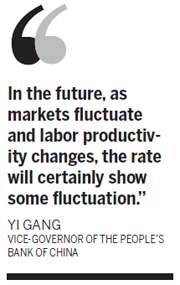Yuan rate 'at right level but fluctuation possible'
The exchange rate against the US dollar is currently at an appropriate level but could fluctuate in the future, Yi Gang, vice-governor of the central bank and head of the State Administration of Foreign Exchange, said on Sunday.
"In the future, as markets fluctuate and labor productivity changes, the rate will certainly show some fluctuation," he said at a seminar.
Last Thursday, the yuan's central parity rate rose to a record high of 6.5849 against the US dollar, after rising for three consecutive trading days, before declining to 6.5952 on Friday.
The yuan has appreciated about 3.6 percent against the dollar since mid-June. A report from the US Treasury said earlier that on an inflation-adjusted basis, the appreciation was even higher, at an annual rate of more than 10 percent.

US Federal Reserve Chairman Ben Bernanke said last Wednesday that China's recent measures to control inflation by raising interest rates is "surprising" and urged Beijing to let its currency rise in value.
Currently the exchange rate is still underestimated by no more than 10 percent, said Lu Mai, secretary-general of the China Development Research Foundation (CDRF).
The resilience of exporters to the rising yuan is stronger than previously estimated, which helps to pave the way for more currency reform to liberalize the yuan, he said.
In 2007 and 2008, the Chinese currency rose by 7 percent annually against the US dollar, but China's GDP only declined by 0.28 percentage points, with inflation down by 0.42 points and workers' wages up by 0.07 points, according to CDRF research.
"The figures showed that progressive currency reform since July 2005 was successful, and the government should accelerate the reform and further free the yuan in the next five years to promote healthy, long-term economic development," Lu said.
China should keep the proportion of its trade surplus to GDP within 5 percent, and avoid further increasing its huge foreign exchange reserves to allow the currency to settle at a balanced level, he said.
China's foreign reserves rose to a record $2.85 trillion at the end of last year, an 18.7 percent increase year-on-year, according to statistics from the People's Bank of China, the central bank.
Yi said he took note of the CDRF findings, but emphasized that further moves depended on both the domestic and international economic situation and appropriate timing.
Lu Feng, an economist at Peking University, said now is the right time to deepen currency reform and let the yuan trade at a higher price as inflation is rising.
Analysts have predicted that the yuan will appreciate this year as inflation may see the government opt for a rising yuan to lower the cost of purchasing international commodities.
Lian Ping, chief economist at the Bank of Communications, predicted the yuan would rise by 5 to 7 percent in 2011.
 0
0 







Go to Forum >>0 Comments